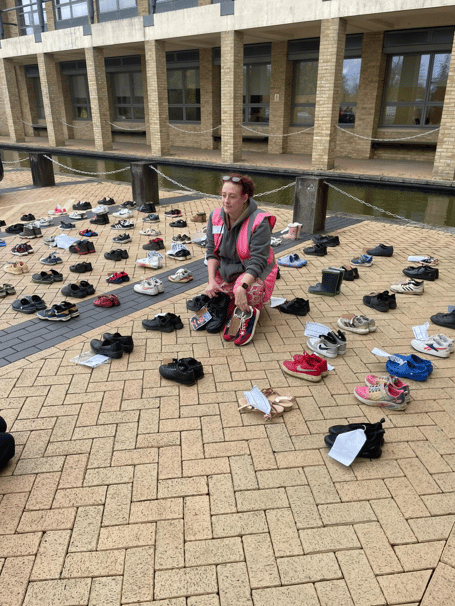Ninety-nine pairs of shoes were set outside Surrey County Council’s Reigate headquarters recently, each marking a child whose Special Educational Needs and Disabilities (SEND) remain unmet.
Among them were the shoes of 17-year-old Eleanor Shepherd, a trans young person with an Education, Health and Care Plan (EHCP) — yet she still has no college place the authority is legally obliged to provide.
The display formed part of a national action that saw more than 5,500 pairs placed outside council buildings across England and Scotland.
Each pair carried a tag describing a child’s experience. Families said the stories showed that those battling for suitable education are not statistics but individuals with needs, ambitions and loved ones. Some families have reported children attempting, or taking, their own lives during long waits for support.

“These are just the tip of the iceberg of the children who have been let down,” said Eleanor’s mother, Abi.
She said Eleanor’s case reflects the barriers many face. Eleanor, who is autistic, struggled in mainstream education even before she suffered a severe traumatic brain injury after being hit by a car on March 1, 2023. She spent six-and-a-half months in hospital, learning again to walk and speak and now lives with significant memory and processing difficulties.
“Before the accident, in Year 9, she had regular detentions and school exclusions because daily she would become overwhelmed and extremely distressed and leave the class or even school. After two years, the school agreed to apply for an EHCP.”
The EHCP was approved while Eleanor was still in hospital and was deferred until her discharge on September 12.
“From October she received a one-hour lesson a week from the school’s SEND team. We pushed for more. In May 2024 she had three hours a week tutoring and in year 11 we managed to get her five hours a week in English, history and science, and four in school studying maths. She took her GCSEs and did really well given the circumstances, including a six in maths and a five-five in combined science.”
Despite this, no post-16 provider has yet offered a place.
“It feels like it is about money,” said Abi. “I understand it’s expensive but you end up with young people with nothing to do who can’t get jobs, which costs more in the long run. She is studying at home but since September nothing has been provided by the local authority. They are working on it, apparently.”
Abi said Eleanor is particularly strong at maths and might take after her great-grandfather, codebreaker Peter Twinn, who worked with Alan Turing during the war.
Event organiser Aimee Bradley, founder of The SEND Sanctuary UK, said: “No parent should ever have to beg for help that should already be there. We need accountability, we need transparency and we need open and honest communication between government and parents so that we are all on the same page.”
Cllr Jonathan Hulley, Surrey County Council cabinet member for children, families and lifelong learning, said: “We know that the national SEND system is not working for families, schools or councils and Government has recognised the urgent need for funding and reform.
“Even so, we are investing heavily to improve our SEND service and just confirmed a further £4.9 million to expand and restructure the service, to go alongside our unprecedented investment in building new specialist school places.
“And over 90 percent of our assessments for Education Health and Care Plans have been completed within the statutory timeframes over the last six months, which is well above the national average. We’re determined to continue upon this improvement journey, and a full end-to-end system review remains ongoing to ensure no stone is left unturned.”





Comments
This article has no comments yet. Be the first to leave a comment.